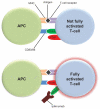Profile of ipilimumab and its role in the treatment of metastatic melanoma
- PMID: 22267918
- PMCID: PMC3257959
- DOI: 10.2147/DDDT.S10945
Profile of ipilimumab and its role in the treatment of metastatic melanoma
Abstract
Melanoma is an immunogenic cancer. However, the ability of the immune system to eradicate melanoma tumors is affected by intrinsic negative regulatory mechanisms. Multiple immune-modulatory therapies are currently being developed to optimize the immune response to melanoma tumors. Two recent Phase III studies using the monoclonal antibody ipilimumab, which targets the cytotoxic T-lymphocyte antigen (CTLA-4), a negative regulator of T-cell activation, have demonstrated improvement in overall survival of metastatic melanoma patients. This review highlights the clinical trial data that supports the efficacy of ipilimumab, the immune-related response criteria used to evaluate clinical response, and side-effect profile associated with ipilimumab treatment.
Keywords: CTLA-4; T-cells; ipilimumab; melanoma.
Figures

Similar articles
-
Ipilimumab: a novel immunostimulatory monoclonal antibody for the treatment of cancer.Pharmacol Res. 2012 Jan;65(1):9-22. doi: 10.1016/j.phrs.2011.09.002. Epub 2011 Sep 10. Pharmacol Res. 2012. PMID: 21930211 Review.
-
Ipilimumab in the treatment of melanoma.Expert Opin Biol Ther. 2012 Jun;12(6):773-82. doi: 10.1517/14712598.2012.675325. Epub 2012 Apr 14. Expert Opin Biol Ther. 2012. PMID: 22500861 Review.
-
Therapeutic efficacy of ipilimumab, an anti-CTLA-4 monoclonal antibody, in patients with metastatic melanoma unresponsive to prior systemic treatments: clinical and immunological evidence from three patient cases.Cancer Immunol Immunother. 2009 Aug;58(8):1297-306. doi: 10.1007/s00262-008-0642-y. Epub 2009 Jan 13. Cancer Immunol Immunother. 2009. PMID: 19139884 Free PMC article.
-
Ipilimumab in the treatment of metastatic melanoma: a summary of recent studies.Tumori. 2013 Nov-Dec;99(6):302e-5e. doi: 10.1700/1390.15474. Tumori. 2013. PMID: 24503809
-
Ipilimumab: an anti-CTLA-4 antibody for metastatic melanoma.Clin Cancer Res. 2011 Nov 15;17(22):6958-62. doi: 10.1158/1078-0432.CCR-11-1595. Epub 2011 Sep 7. Clin Cancer Res. 2011. PMID: 21900389 Free PMC article. Review.
Cited by
-
Ipilimumab in the treatment of metastatic melanoma: management of adverse events.Onco Targets Ther. 2014 Feb 19;7:203-9. doi: 10.2147/OTT.S57335. eCollection 2014. Onco Targets Ther. 2014. PMID: 24570590 Free PMC article. Review.
-
Functionalized Superparamagnetic Iron Oxide Nanoparticles (SPIONs) as Platform for the Targeted Multimodal Tumor Therapy.Front Oncol. 2019 Feb 13;9:59. doi: 10.3389/fonc.2019.00059. eCollection 2019. Front Oncol. 2019. PMID: 30815389 Free PMC article.
-
Ipilimumab-induced hypophysitis: review of the literature.J Endocrinol Invest. 2015 Nov;38(11):1159-66. doi: 10.1007/s40618-015-0301-z. Epub 2015 May 10. J Endocrinol Invest. 2015. PMID: 25957829 Review.
-
Biomarkers, measured during therapy, for response of melanoma patients to immune checkpoint inhibitors: a systematic review.Melanoma Res. 2019 Oct;29(5):453-464. doi: 10.1097/CMR.0000000000000589. Melanoma Res. 2019. PMID: 30855527 Free PMC article.
-
Ipilimumab and Its Derived EGFR Aptamer-Based Conjugate Induce Efficient NK Cell Activation against Cancer Cells.Cancers (Basel). 2020 Feb 1;12(2):331. doi: 10.3390/cancers12020331. Cancers (Basel). 2020. PMID: 32024070 Free PMC article.
References
-
- Atkins MB, Lotze MT, Dutcher JP, et al. High-dose recombinant interleukin 2 therapy for patients with metastatic melanoma: analysis of 270 patients treated between 1985 and 1993. J Clin Oncol. 1999;17(7):2105–2116. - PubMed
-
- Besser MJ, Shapira-Frommer R, Treves AJ, et al. Clinical responses in a phase II study using adoptive transfer of short-term cultured tumor infiltration lymphocytes in metastatic melanoma patients. Clin Cancer Res. 2010;16(9):2646–2655. - PubMed
Publication types
MeSH terms
Substances
LinkOut - more resources
Full Text Sources
Medical

